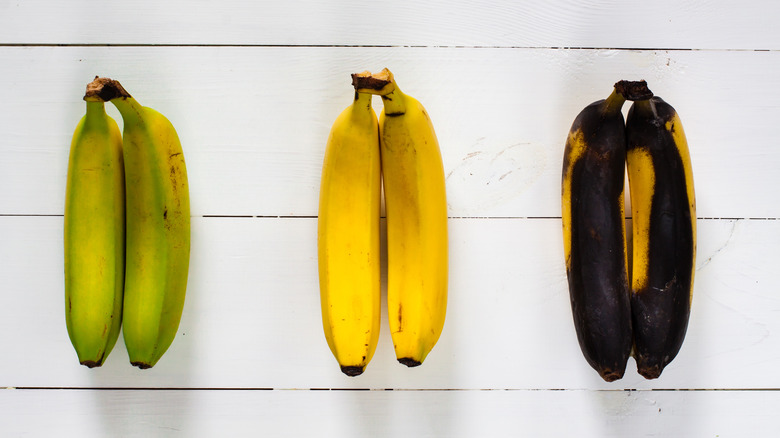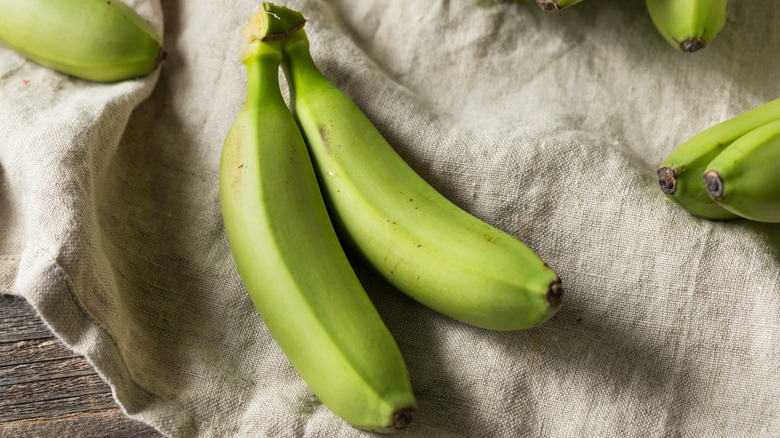Let This Popular Fruit Ripen To Help You Poop Instantly
We don't often think about poop health until we're sitting on a toilet seat and straining (FYI, straining to go isn't recommended by experts. It can lead to rectal injury, hemorrhoids, and anal fissures, especially if done often).
Okay, back to the toilet seat. Feeling uncomfortably blocked up, gassy, and taking frequent trips to the bathroom to (hopefully) find release can start to feel like an all-day affair. Suddenly, pooping is all that's occupying your mind. Who wants that? But as it turns out, a lot of people (four million people in the U.S., per Johns Hopkins Medicine), experience constipation.
If you're looking for genius ways to get yourself to poop instantly, you may have already heard that bananas can help in that department. But did you know that there's a debate as to whether or not the fruit has to be ripe for you to get that all-important bowel movement? As it turns out, there is. Let's take a closer look.
Unripe vs. ripe bananas: What's best for constipation relief?
When you're holding in poop (not by conscious choice, of course), you may not consider the color or ripeness of this popular fruit sitting on your dining table. But experts advise you to.
The idea is that bananas, native to Southeast Asia, go through different stages of ripeness, and this results in changes in both their color (which you can see) and nutrient profile (which you can't see but can feel, hence the poop benefit). Ripe bananas are what are most recommended if you're looking for a laxative benefit. The fully green ones, or ones with green ends, aren't. As explained by Cleveland Clinic gastroenterologist Dr. Christine Lee (via Everyday Health), "Bananas, when fully ripe, contain soluble fiber and thus can help treat constipation. However, unripe, or green, bananas have high levels of resistant starch, which can be very binding and cause constipation."
The yellow and ripe kind also contain good amounts of sugar, which also help ease things along when you're stuck. However, the sugar content in ripe bananas can be potentially upsetting for those on a low-FODMAP diet. Ripe bananas are considered a high-FODMAP food, which means they could result in bloating, gas, digestive discomfort, and stomach pain in people who have irritable bowel syndrome (IBS) and other digestive conditions. Going back to green (or unripe) bananas, should you avoid them entirely? Not exactly.
Do green bananas help with poop health too?
The resistant starch in unripe bananas can be beneficial for your gut. For starters, it contains fiber-like properties, which means it escapes the usual digestion process and ends up directly in your large colon, eventually becoming a source of food for your "good" gut microbiome.
A 2017 study in the International Journal of Food Sciences and Nutrition found that consuming resistant starch helped improve short-chain fatty acid levels in the large bowel of healthy adults. Short-chain fatty acids are linked to a host of overall health factors like anti-inflammatory properties that combat digestive problems like diarrhea and inflammatory bowel disease (IBD), prevent colon cancer, control blood glucose levels and improve insulin resistance in people with type 2 diabetes, and reduce your risk of heart disease.
As for green bananas, some research suggests their fiber-like properties can actually help keep you regular, like a poop button to help keep things moving. We need more research before coming to definitive conclusions, but you should probably err on the side of caution and stick with the ripe kind if you're constipated and looking to get some relief. Speaking of ripe, did you know that even overly ripe bananas needn't be thrown away? According to registered dietitian nutritionist Kathleen Johnson (via Well+Good), you could benefit from their higher antioxidant content. "While the conversion of starch to sugar is the most notable change during the ripening process, vitamins, minerals, and antioxidants also develop and convert as fruit ripens."



